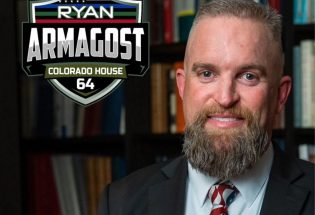Election 2022 – Colorado amendments, part 2
Proposition 121 offers income tax cut for all Coloradans
In 1987, Colorado instituted a flat income tax rate – the rate, at the time 5% of federal taxable income is the same for all taxpayers regardless of annual earned income. Prior to 1987, Colorado had a graduated income tax rate similar to the federal tax rate where income tax rates increased incrementally based upon earned income; those who earned more money paid a higher percentage.
In 1999, the flat tax rate was lowered from 5% to 4.75%, in 2000 it was lowered to 4.63%, in 2020 it was lowed to 4.55% and this measure, Proposition 121, if approved would further lower the rate to 4.40%.
Prop 121 found its way to the ballot by means of citizen initiated state statute which required, in accordance with state election law, valid signatures equal to 5% of the votes cast in the Secretary of State election in the most recent general election. In 2018, there were 2,492,635 total votes cast in the race for Secretary of State, meaning that 124,632 valid signatures were required on circulated petitions to place Prop 121 on the ballot. Supporters submitted 215,365 signatures and a random sample conducted by the Colorado Secretary of State’s office estimated at least 148,189 were valid, easily enough to qualify for the 2022 election.
The measure was initially sponsored by State Senator Jerry Sonnenberg (R-Sterling) and Jon Caldera of the Independence Institute, a conservative think tank and interest group. The measure has also been formally endorsed by Coloradans for Civil Liberties, Colorado Rising Action and Defend Colorado.
Michael Fields, President of the conservative advocacy group Advance Colorado, argued in support of Prop 121 writing, “Proposition #121 does exactly what the title of the measure says it will do – lower state income taxes for everyone … without causing any corresponding reduction in the 2022 TABOR refund, which was already budgeted. What’s even better about Proposition #121 is that it will add jobs to Colorado’s economy. The dynamic impact of tax savings in 2023 would be an estimated additional 9,110 jobs. It would also reduce the size of the state government by increasing private-sector employment and decreasing government employment in the long run. Colorado’s budget has grown $10 billion in just the last 4 years. And as costs skyrocket for everyone, Proposition #121 is simply a great first step in giving some money back to the people who deserve it most – the hardworking people of this state.”
The Bell Policy Center, a progressive advocacy group whose mission is to “ensure economic mobility for every Coloradan … by fighting for TABOR reforms, new programs in our education system, higher wages for workers, advances in human services, and better consumer protections for Coloradans” has come out in opposition to Prop 121.
Bell Policy’s president, Scott Wasserman, released a statement that said, “This November, you’re going to be asked once again if you want to lower your income taxes. It will be a simple proposition. Do you want to pay less? Hidden from that question will be the consequences for our schools, health, and public safety. In truth, the consequences are real. It’s a bait and switch. Those with huge incomes save a bunch, and the rest of us end up paying more in sales, property, and sin taxes. As you get ready to think about the 2022 ballot, ask yourself if the Coloradans of 1992 had any idea of what our world would look like. And more importantly, ask yourself if year after year of taxpayer whiplash is the future you want for Colorado?”
A “yes” vote on Prop 121 is a vote in favor of lowering the Colorado flat income tax rate from 4.55% to 4.40%. A “no” vote on Prop 121 is a vote in favor of keeping the rate at its current 4.55%.
Proposition 122 to decriminalize “magic mushrooms” and other hallucinogenic drugs
In November 2012, Colorado, joined by Washington, made history when the two states became the first in the nation to fully legalize marijuana for recreational use. In 2020, votes in the state of Oregon passed Measure 110, which in effect full legalized the personal possession and use of all drugs.
This November, Colorado voters will have the opportunity to legalize certain types of psychedelic and hallucinogenic plants and fungi. The measure, Proposition 122, if approved, would change state statute to define dimethyltryptamine (DMT), ibogaine, mescaline (excluding peyote), psilocybin (known as “magic mushrooms”) and psilocyn and natural medicines and thereby decriminalize the use, possession, growth and transport of these for residents 21 years of age or older. Currently, these substances are defined as Schedule 1 controlled substances; heroin, LSD and PCP are other Schedule 1 controlled substances in the state.
The measure further calls for the creation of the Regulated Natural Medicine Access Program for licensed healing centers to administer natural medicine services, including the aforementioned agents.
Prop 122 found its way to the ballot by means of citizen initiated state statute which required, in accordance with state election law, valid signatures equal to 5% of the votes cast in the Secretary of State election in the most recent general election. In 2018, there were 2,492,635 total votes cast in the race for Secretary of State, meaning that 124,632 valid signatures were required on circulated petitions to place Prop 121 on the ballot. Supporters submitted 225,140 signatures and a random sample conducted by the Colorado Secretary of State’s office estimated at least 138,760 were valid.
The group Natural Medicine Colorado was formed to champion Prop 122, which the group refers to as the “Natural Medicine Health Act of 2022.” In supporting the measure, the group released a statement which read, “The Natural Medicine Health Act creates regulated access to natural psychedelic medicines, giving Coloradans who are struggling with challenging mental health issues the opportunity to heal. The measure also removes criminal penalties for the personal use of natural medicines and creates a path for Coloradans to seal criminal records related to natural medicines. Natural psychedelic medicines are non-addictive and can have profound benefits for people struggling with challenging mental health conditions including depression and anxiety and those struggling to find peace at the end of their lives. Johns Hopkins, UCLA, NYU and other leading research universities have studied psychedelic therapies, and the FDA has granted one natural medicine, psilocybin, ‘breakthrough treatment’ status for its success with treatment resistant depression, meaning psilocybin has succeeded where other methods have failed.”
The group Protecting Colorado Kids has come out in opposition to Prop 122 stating, “Colorado is high enough. We don’t need more drugs sold in our communities, with easier access for our children. The psychedelics industry is backed by Big Pharma and the usual cast of addiction-for-profit characters harming our communities. Psychedelics have a strong connection to mental health harms, further victimizing users in a time of a national mental health crisis. Leading scientific authorities like the American Psychiatric Association think this is not the time to experiment so openly with these drugs.”
A “yes” vote of Prop 122 is a vote in favor of legalizing the personal use, possession, growth and transport of the mentioned hallucinogenic substances. A “no” vote is vote in favor of keeping the substances illegal as Schedule 1 narcotics in Colorado.
Proposition 123 aims to dedicate tax revenue for affordable housing projects
As Colorado continues to grow, it is no secret that rents and home prices have seen a dramatic rise, pricing many out of the market while also forcing residents to pay a greater and greater portion of their income for their home. Generations’ high inflation rates and economic stagnation have only served to exacerbate these problems over the last couple of years.
Proposition 123 aims to address the lack of affordable housing in Colorado by dedicating 0.1% of Colorado income tax revenue to affordable housing projects statewide through the creation of the State Affordable Housing Fund (SAHF).
The measure defines “affordable housing” as “rental housing that is affordable to a household with an annual income of at or below 60% of the area median income, and that costs the household less than 30% of its monthly income and for-sale housing that could be purchased by a household with an annual income of at or below 100% of the area median income, for which the mortgage payment costs the household less than 30% of its monthly income.”
More specifically, Prop 123 aims to help address the lack of affordable housing, as defined above, in the state through six specific endeavors. One, provide grants to local governments and loans to non-profit organizations to acquire land to construct affordable housing. Two, create an affordable housing equity program to invest in multifamily rental properties with rents capped at 30% of a household’s annual income. Three, create a program to provide debt financing for low- and middle-income multifamily rental units.
Four, create a program providing down payment assistance for prospective homebuyers that meet income requirements. Five create a grant program for local governments to increase their ability to process various land use, permitting and zoning processes. And six, create a program to provide various forms of assistance to address homelessness in the state.
Prop 123 found its way to the ballot by means of citizen initiated state statute which required, in accordance with state election law, valid signatures equal to 5% of the votes cast in the Secretary of State election in the most recent general election. In 2018, there were 2,492,635 total votes cast in the race for Secretary of State, meaning that 124,632 valid signatures were required on circulated petitions to place Prop 121 on the ballot. Supporters submitted 230,748 signatures and a random sample conducted by the Colorado Secretary of State’s office estimated at least 149,072 were valid.
Four current state legislators have come out in support of Prop 123 – State Sen. Rhonda Fields (D), State Sen. Julie Gonzales (D), State Rep. Naquetta Ricks (D), and State Rep. Steven Woodrow (D). Mike Johnston, former Democratic state senator spoke in support of the measure saying, “What we know is we’re going to need a permanent stable revenue source committed to keeping housing affordable in this state if we’re going to solve that problem. This gives them a chance to vote on that. What this will get us is 10,000 more affordable units every year in Colorado that teachers and nurses and firefighters and people can have a place to live. One of the things that this can do is help build more of those permanent supportive housing units that people have as their first transition off the streets.”
Michael Fields, Director of Advance Colorado, spoke out against Prop 123, arguing that it will cost Colorado taxpayers money in a time of economic distress saying, “There is nothing affordable about taking $300 million of our TABOR tax refunds for a flawed housing measure. To fix our state’s housing crisis, we need to build more, not tax more. Coloradans are struggling, and they want their full TABOR refund in upcoming years.
The Colorado Springs Gazette also expressed opposition to the measure, writing in an editorial, “The ballot proposal’s plan for throwing a lot of money at the problem in wide-ranging ways is too unfocused to make meaningful progress. Its reach into Colorado taxpayers’ pockets for such an unrealistic agenda can’t be justified. Money (Prop) 123 would pump into further stoking the demand side of the state’s superheated housing economy, it would do nothing to address the limited supply of housing that drives up prices in the first place. That involves a separate undertaking — reassessing the state and local statutory and regulatory hurdles to housing construction. Colorado’s affordable-housing problem is real; Prop. 123 isn’t up to the challenge. Vote no.”
A “yes” vote on Prop 123 is a vote in favor of dedicating 0.1% of state tax revenue to create the SAHF. A “no” vote rejects the program.
Proposition GG to require income tax impacts on proposed ballot measures
This election, Colorado voters will have an opportunity to require that proposed ballot measures – constitutional amendments, ballot propositions and referenda – to disclose an income tax impact table laying out how a proposed measure would impact, either positively or negatively, income tax owed as a result of the measure being put forth.
If approved, Proposition GG would require that the voter information “Blue Book” that is sent to all registered voters prior to elections, if the measure an impact or potential impact on Coloradans’ income taxes, to include a table with four columns outlining tax impact.
The first column of the table will include eight federal adjusted gross income brackets – $25,000 or less, $25,000 to $50,000, $50,000 to $100,000, $100,000 to $200,000, $200,000 to $500,000, $500,000 to $1,000,000, $1,000,000 to $2,000,000, and $2,000,000 to $5,000,000. The other three columns would list current average income tax owed, proposed average income tax owed and proposed change in average income tax owed for each of the eight brackets.
Prop GG made its way to the ballot by means of legislatively referred state statute, requiring a simple majority in both chambers of the Colorado General Assembly to be placed on the ballot. The measure, which began as Senate Bill 22-222, was passed on an almost entirely party-line vote with 20 Senate Democrats and 40 House Democrats in favor and 15 Senate Republicans and 22 House Republicans opposed.
The measure was co-sponsored by two legislators from each chamber – State Sen. Dominick Moreno (D), State Sen. Brittany Pettersen (D), State Rep. Chris Kennedy (D) and State Rep. Mike Weissman (D) with Sen. Pettersen remarking it is, “an incredibly important tax transparency measure.”
Common Cause Colorado, a progressive interest group, released a statement reading in part, “Tax policy is often complicated, but it affects us all, and voters have a right to know how their individual family will be impacted as well as how it will impact the state. In Colorado, we vote on every change to our taxes so it’s vital that voters get the full picture. Proposition GG will increase transparency on our ballots and provide voters with clear, unbiased information.”
Michael Fields, President of the conservative advocacy group Advance Colorado, released statement in opposition to Prop GG which stated, “I don’t think it makes sense because it’s adding this to the actual ballot language. We have a whole Blue Book that explains everything and has arguments for/against etc. … People already complain the ballot language is too long and confusing. This legislature should spend more time on increasing public safety and lowering the cost of living — and less on meddling in the citizens’ initiative process.”
A “yes” vote on Prop GG is a vote in favor of requiring an income tax impact summary with included chart for every ballot measure put before Colorado voters. A “no” vote on Prop GG is a vote to keep things as they are now.
- November, 29 2023

State General Assembly meets after Pr...
By Brendan Henry and Will Cornelius The Surveyor After Colorado voters shot down Proposition HH...
- October, 19 2020

Early in-person voting begins statewi...
Special to the Surveyor Voter Service and Polling Centers (VSPCs) across Colorado are now open...
- October, 15 2020

Charlie Winn (R) Second Congressional...
Where some see challenges, Dr. Charles Winn, Republican candidate for the second congressional district that...
- January, 04 2024

Nominations open for Berthoud town b...
By Will Cornelius The Surveyor On Tuesday, nominations opened for candidates considering running for the...
- October, 08 2020

Kristin Stephens (D) Larimer County C...
After 30 years as a resident of the county, residing in the southwestern area of...
- November, 11 2022

Armagost wins House District 64
On Tuesday night voters overwhelmingly backed Republican Ryan Armagost for Colorado State House District 64...

POLICEBLOTTER
Community News
Northern Water sets C-BT quota at 70% for 2024
Community News

Emotions run high during Revere Property hearing
Community News
Snowpack at 119% above normal
Community News

Karspeck to serve third term as Berthoud mayor
Community News

OPINION – No bitchin’ allowed
Community News
Roy Tripi to become principal of BHS on July 1
Community News
COMMUNITY CALENDAR:
Community Calendar – add an event
Homestead Fine Art Gallery First Fridays OPEN HOUSE
03 May 4:00 PM - 7:00 PM
Homestead Fine Art Gallery First Fridays OPEN HOUSE
07 Jun 4:00 PM - 7:00 PM
Homestead Fine Art Gallery First Fridays OPEN HOUSE
05 Jul 4:00 PM - 7:00 PM
Homestead Fine Art Gallery First Fridays OPEN HOUSE
02 Aug 4:00 PM - 7:00 PM
Homestead Fine Art Gallery First Fridays OPEN HOUSE
06 Sep 4:00 PM - 7:00 PM
Homestead Fine Art Gallery First Fridays OPEN HOUSE
04 Oct 4:00 PM - 7:00 PM

